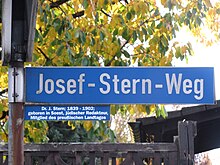Josef Stern (journalist)
Josef Stern , rarely also Joseph Stern, (born March 11, 1839 in Soest , † December 16, 1902 in Frankfurt am Main ) was a German journalist. He was a committed campaigner for democracy in Germany and a liberal MP for Frankfurt in the Prussian House of Representatives during the XV. Electoral term 1882–1885. He has been imprisoned numerous times for his beliefs.
background
Josef Stern came from a Jewish family that had lived in Soest since 1700 , but was neither a member of the (organized) Jewish denomination nor of any other denomination or religion. Stern was Herz Stern's ninth child and grew up in the Stern house at 22 Soester Thomästraße. After completing school at the Soest Archigymnasium (1848–1857), he first studied in Bonn and then, because of the factual ban on doctoral studies for Jews, transferred to the Catholic University in Münster , where he received the qualification to become a high school teacher in classical philology and history. During his studies he became a member of the Helvetia Bonn fraternity in 1857 . Since Jews were not hired as state teachers at the time, Stern initially worked as a private teacher on an estate near Bromberg in West Prussia . Here he also wrote his first journalistic articles for the Rheinische Zeitung and founded the "Neue Bromberger Zeitung". After temporarily working for the Berlin radical-democratic newspaper “Die Zukunft”, which was discontinued in 1870, under the editorship of Johann Jacoby and his later father-in-law Guido Weiß , Stern became the chief editor of the Neue Badische Landeszeitung on December 14, 1868 . He remained first editor even after Johann Peter Eichelsdörfer, a former editor, returned to the state newspaper. Stern worked for the Frankfurter Zeitung from 1872 , first as a Berlin correspondent, then from 1873 as an editor. As part of the collegial constitution without an editor-in-chief introduced by the publisher Leopold Sonnemann in 1873 , the leading article writer Stern had the position of “Primus inter Pares”. Josef Stern was practically the successor to the former editor-in-chief Karl Volckhausen , who in turn succeeded Stern at the Neue Badische Landeszeitung. Politically, Stern supported the resistance against Bismarck's Kleindeutsche solution . During his membership in the Prussian state parliament he was on the Catholic side in the Kulturkampf . In 1883, Stern applied for the introduction of secret suffrage in Prussia against the existing three-class suffrage, but this did not find a majority. Based on his convictions, Stern was imprisoned five times, a total of at least 13 months.
Stern died of a stroke while visiting the Frankfurt Opera . He was married to Margarete "Gretchen" Weiss for 16 years until her death in 1890.
literature
- Helge Dvorak: Biographical Lexicon of the German Burschenschaft. Volume I: Politicians. Sub-Volume 5: R – S. Winter, Heidelberg 2002, ISBN 3-8253-1256-9 , p. 516.
- Alfred E. Laurence: Dr. Josef Stern (1839–1902): A forgotten “professional criminal” in Soest. In: Soester magazine. Booklet 85, Soest 1973, pp. 105-111. (Figs. 60 and 61).
- Siegfried Nassauer: Josef Stern: Life picture of a journalist . Voigt & Gleiber, 1931.
- Sigmund Schott : Stern, Josef. In: Anton Bettelheim (Hrsg.): Biographisches Jahrbuch and German Nekrolog. Volume 7, Reimer, Berlin 1902, pp. 312-314. Digitized
- Grete Stern: Preparatory work for a story of the Stern family in Soest. Soest 1960. Masch.-Schr. Manuscript in the Soest City Archives.
- Wolfgang Klötzer (Hrsg.): Frankfurter Biographie . Personal history lexicon . Second volume. M – Z (= publications of the Frankfurt Historical Commission . Volume XIX , no. 2 ). Waldemar Kramer, Frankfurt am Main 1996, ISBN 3-7829-0459-1 .
- Stern, Josef : In: Paul Arnsberg : The history of the Frankfurt Jews since the French Revolution . Volume III. Eduard Roether, Darmstadt 1983, pp. 494-495. ISBN 3-7929-0130-7 .
Individual evidence
- ↑ The family tradition in Soest begins with Jakob Stern, who moved from Frankfurt around 1700, and it ends with Anna Stern, who returned from emigration and died in 1970. According to: Ulrike Sasse-Voswinckel / Gerhard Köhn: Jewish neighbors in Soest until 1942. A city tour . Compiled on behalf of the Society for History and Homeland Care Soest. Soest 2001, p. 6
- ↑ Alfred E. Laurence leads u. a. that the word "religion" was replaced by "dissident" on his Frankfurt death certificate. See: Alfred E. Laurence: Dr. Josef Stern (1839–1902): A forgotten “professional criminal” in Soest. In: Soester magazine. Booklet 85, Soest 1973, pp. 105–111, here pp. 106f.
- ↑ a b Ibid., P. 106
- ^ Helge Dvorak: Biographical Lexicon of the German Burschenschaft. Volume I: Politicians. Sub-Volume 5: R – S. Winter, Heidelberg 2002, ISBN 3-8253-1256-9 , p. 516.
- ↑ Ibid., P. 107
- ↑ a b http://www.udo-leuschner.de/zeitungsgeschichte/spd/nblz.htm Website accessed on February 27, 2011
- ↑ Werner Becker: Democracy of social law. Musterschmidt, 1971, p. 29
- ^ Alfred E. Laurence: Dr. Josef Stern (1839–1902): A forgotten “professional criminal” in Soest. In: Soester magazine. Booklet 85, Soest 1973, pp. 105–111, here p. 108
- ↑ Information on political activity according to Alfred E. Laurence: Dr. Josef Stern (1839–1902): A forgotten “professional criminal” in Soest. In: Soester magazine. Booklet 85, Soest 1973, pp. 105–111, here pp. 108–109
- ↑ See ibid., P. 110
- ↑ Ibid., P. 110
- ↑ Ibid., P. 109f.
| personal data | |
|---|---|
| SURNAME | Stern, Josef |
| ALTERNATIVE NAMES | Stern, Joseph |
| BRIEF DESCRIPTION | German journalist, editor of the Frankfurter Zeitung, member of the Prussian House of Representatives (15th electoral term) |
| DATE OF BIRTH | March 11, 1839 |
| PLACE OF BIRTH | Soest |
| DATE OF DEATH | December 16, 1902 |
| Place of death | Frankfurt am Main |
